BMP4002 - Business Law: UK Legal System and its Impact on Businesses
VerifiedAdded on 2023/06/07
|8
|2502
|447
Report
AI Summary
This report provides a comprehensive overview of the UK legal system, focusing on its classifications, sources, and impact on commercial organizations, particularly multilingual entities. It defines law within the UK context, discusses the characteristics of civil and criminal law, and identifies the three different legal systems in the UK. The report also explains the hierarchy of the principal sources of laws, including Acts of Parliament, case law, European Union law, and international law, detailing their characteristics and impact. Furthermore, it examines the direct impact of UK law-making processes on commercial organizations, using employment law as a key example, highlighting legislation such as the Employment Rights Act 1996, the National Minimum Wage Act 1998, and the Equality Act 2010. The analysis emphasizes the importance of these laws in protecting employees' rights, promoting equality, and fostering harmonious employer-employee relations.
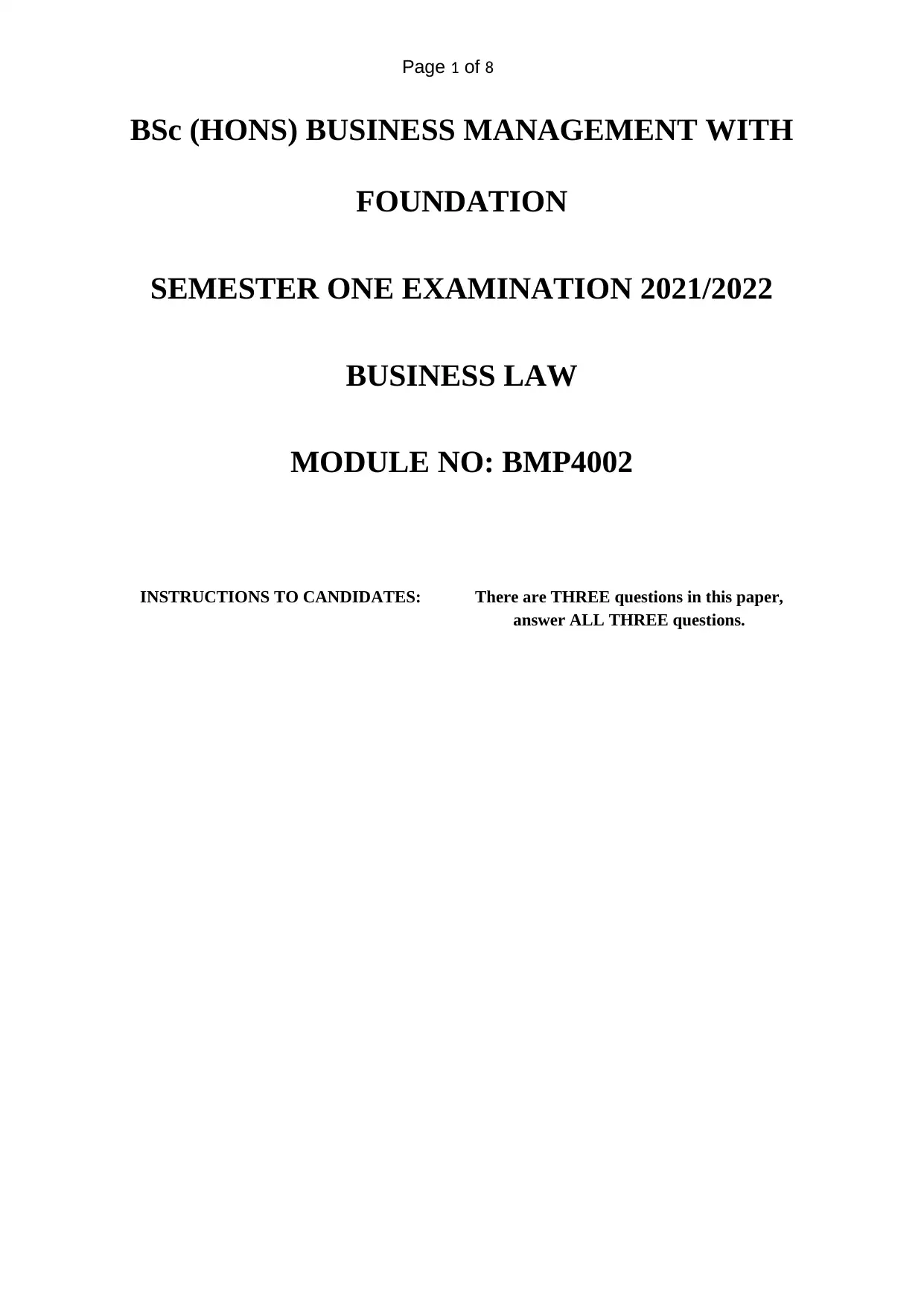
Page 1 of 8
BSc (HONS) BUSINESS MANAGEMENT WITH
FOUNDATION
SEMESTER ONE EXAMINATION 2021/2022
BUSINESS LAW
MODULE NO: BMP4002
INSTRUCTIONS TO CANDIDATES: There are THREE questions in this paper,
answer ALL THREE questions.
BSc (HONS) BUSINESS MANAGEMENT WITH
FOUNDATION
SEMESTER ONE EXAMINATION 2021/2022
BUSINESS LAW
MODULE NO: BMP4002
INSTRUCTIONS TO CANDIDATES: There are THREE questions in this paper,
answer ALL THREE questions.
Paraphrase This Document
Need a fresh take? Get an instant paraphrase of this document with our AI Paraphraser
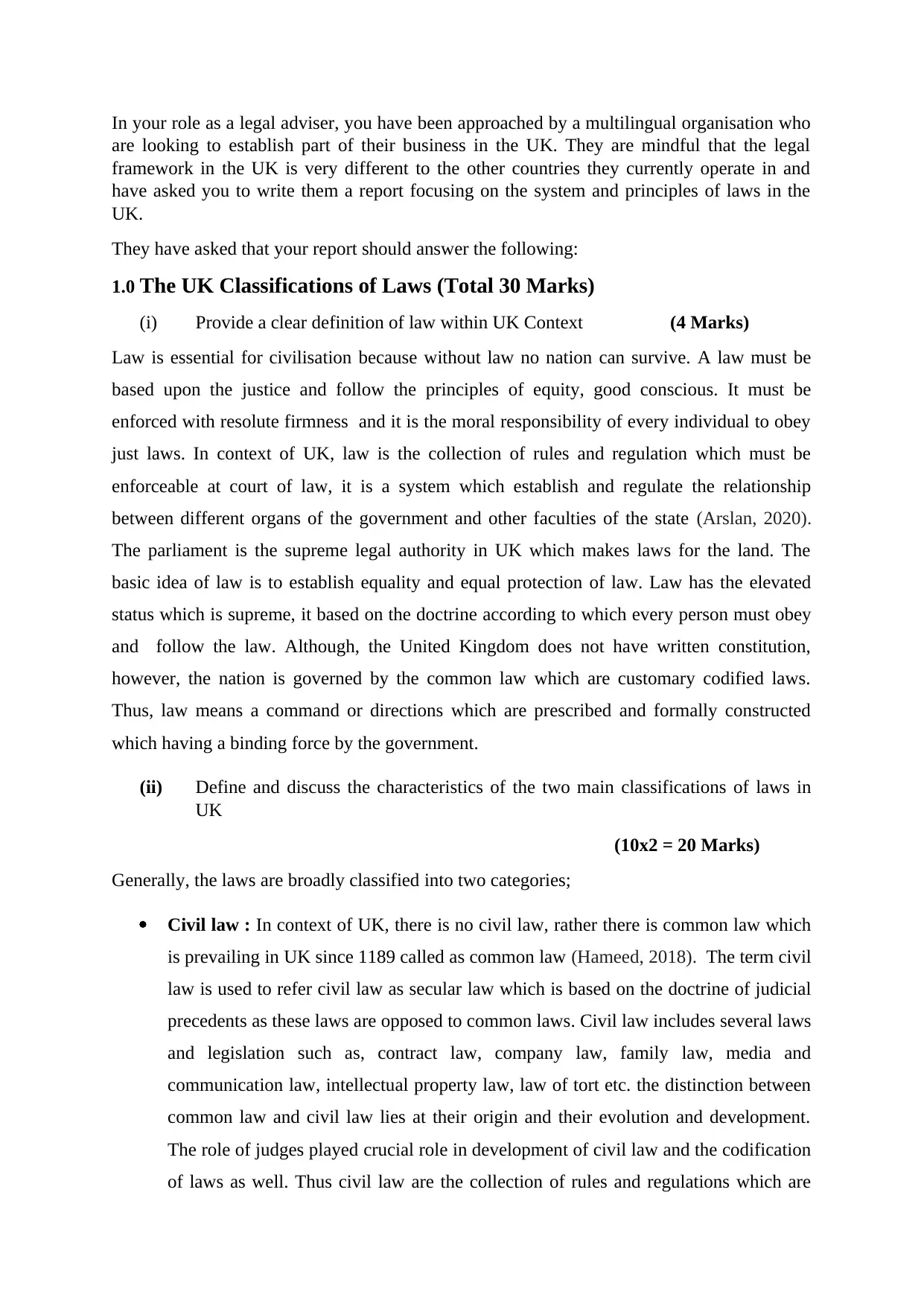
In your role as a legal adviser, you have been approached by a multilingual organisation who
are looking to establish part of their business in the UK. They are mindful that the legal
framework in the UK is very different to the other countries they currently operate in and
have asked you to write them a report focusing on the system and principles of laws in the
UK.
They have asked that your report should answer the following:
1.0 The UK Classifications of Laws (Total 30 Marks)
(i) Provide a clear definition of law within UK Context (4 Marks)
Law is essential for civilisation because without law no nation can survive. A law must be
based upon the justice and follow the principles of equity, good conscious. It must be
enforced with resolute firmness and it is the moral responsibility of every individual to obey
just laws. In context of UK, law is the collection of rules and regulation which must be
enforceable at court of law, it is a system which establish and regulate the relationship
between different organs of the government and other faculties of the state (Arslan, 2020).
The parliament is the supreme legal authority in UK which makes laws for the land. The
basic idea of law is to establish equality and equal protection of law. Law has the elevated
status which is supreme, it based on the doctrine according to which every person must obey
and follow the law. Although, the United Kingdom does not have written constitution,
however, the nation is governed by the common law which are customary codified laws.
Thus, law means a command or directions which are prescribed and formally constructed
which having a binding force by the government.
(ii) Define and discuss the characteristics of the two main classifications of laws in
UK
(10x2 = 20 Marks)
Generally, the laws are broadly classified into two categories;
Civil law : In context of UK, there is no civil law, rather there is common law which
is prevailing in UK since 1189 called as common law (Hameed, 2018). The term civil
law is used to refer civil law as secular law which is based on the doctrine of judicial
precedents as these laws are opposed to common laws. Civil law includes several laws
and legislation such as, contract law, company law, family law, media and
communication law, intellectual property law, law of tort etc. the distinction between
common law and civil law lies at their origin and their evolution and development.
The role of judges played crucial role in development of civil law and the codification
of laws as well. Thus civil law are the collection of rules and regulations which are
are looking to establish part of their business in the UK. They are mindful that the legal
framework in the UK is very different to the other countries they currently operate in and
have asked you to write them a report focusing on the system and principles of laws in the
UK.
They have asked that your report should answer the following:
1.0 The UK Classifications of Laws (Total 30 Marks)
(i) Provide a clear definition of law within UK Context (4 Marks)
Law is essential for civilisation because without law no nation can survive. A law must be
based upon the justice and follow the principles of equity, good conscious. It must be
enforced with resolute firmness and it is the moral responsibility of every individual to obey
just laws. In context of UK, law is the collection of rules and regulation which must be
enforceable at court of law, it is a system which establish and regulate the relationship
between different organs of the government and other faculties of the state (Arslan, 2020).
The parliament is the supreme legal authority in UK which makes laws for the land. The
basic idea of law is to establish equality and equal protection of law. Law has the elevated
status which is supreme, it based on the doctrine according to which every person must obey
and follow the law. Although, the United Kingdom does not have written constitution,
however, the nation is governed by the common law which are customary codified laws.
Thus, law means a command or directions which are prescribed and formally constructed
which having a binding force by the government.
(ii) Define and discuss the characteristics of the two main classifications of laws in
UK
(10x2 = 20 Marks)
Generally, the laws are broadly classified into two categories;
Civil law : In context of UK, there is no civil law, rather there is common law which
is prevailing in UK since 1189 called as common law (Hameed, 2018). The term civil
law is used to refer civil law as secular law which is based on the doctrine of judicial
precedents as these laws are opposed to common laws. Civil law includes several laws
and legislation such as, contract law, company law, family law, media and
communication law, intellectual property law, law of tort etc. the distinction between
common law and civil law lies at their origin and their evolution and development.
The role of judges played crucial role in development of civil law and the codification
of laws as well. Thus civil law are the collection of rules and regulations which are
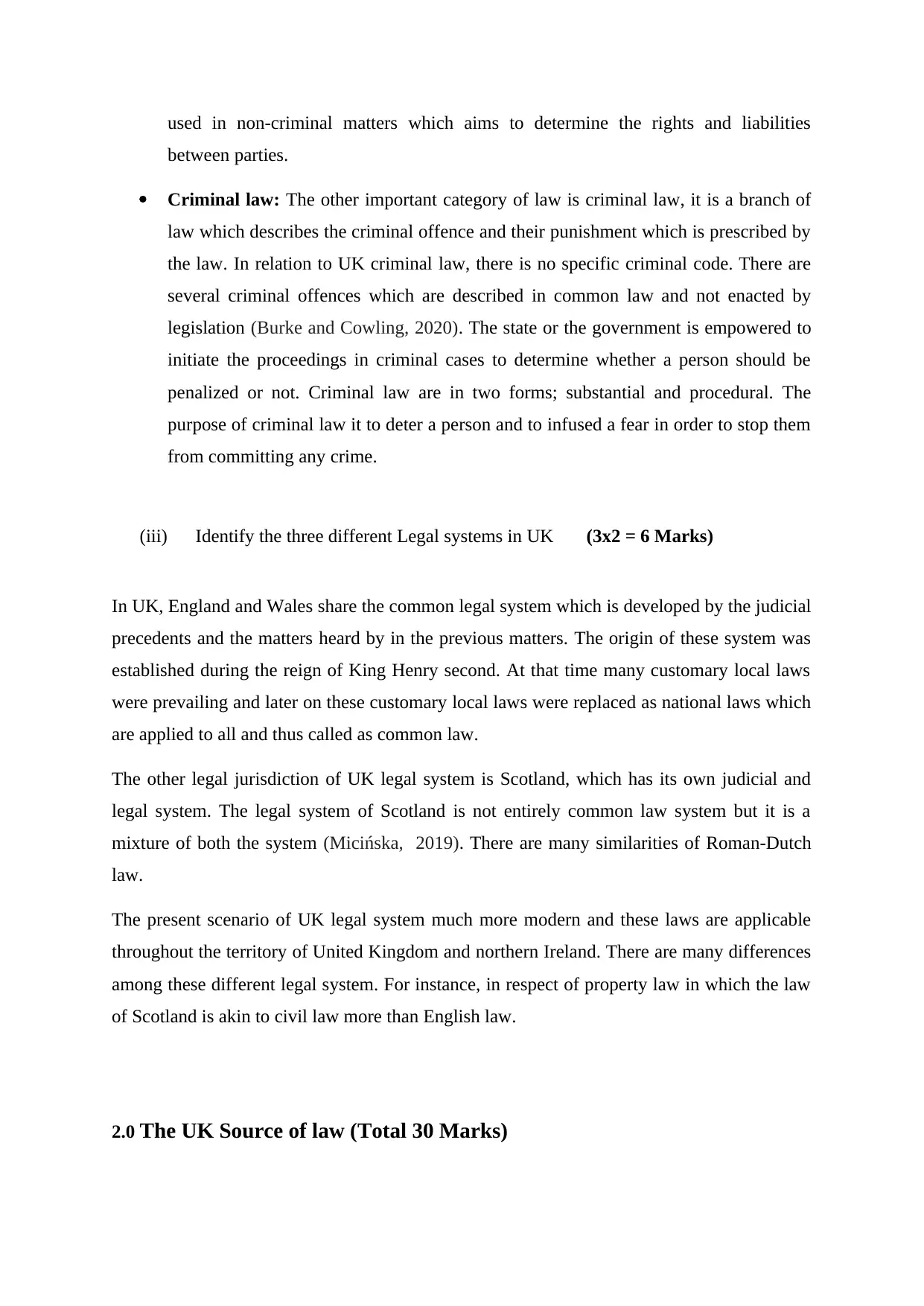
used in non-criminal matters which aims to determine the rights and liabilities
between parties.
Criminal law: The other important category of law is criminal law, it is a branch of
law which describes the criminal offence and their punishment which is prescribed by
the law. In relation to UK criminal law, there is no specific criminal code. There are
several criminal offences which are described in common law and not enacted by
legislation (Burke and Cowling, 2020). The state or the government is empowered to
initiate the proceedings in criminal cases to determine whether a person should be
penalized or not. Criminal law are in two forms; substantial and procedural. The
purpose of criminal law it to deter a person and to infused a fear in order to stop them
from committing any crime.
(iii) Identify the three different Legal systems in UK (3x2 = 6 Marks)
In UK, England and Wales share the common legal system which is developed by the judicial
precedents and the matters heard by in the previous matters. The origin of these system was
established during the reign of King Henry second. At that time many customary local laws
were prevailing and later on these customary local laws were replaced as national laws which
are applied to all and thus called as common law.
The other legal jurisdiction of UK legal system is Scotland, which has its own judicial and
legal system. The legal system of Scotland is not entirely common law system but it is a
mixture of both the system (Micińska, 2019). There are many similarities of Roman-Dutch
law.
The present scenario of UK legal system much more modern and these laws are applicable
throughout the territory of United Kingdom and northern Ireland. There are many differences
among these different legal system. For instance, in respect of property law in which the law
of Scotland is akin to civil law more than English law.
2.0 The UK Source of law (Total 30 Marks)
between parties.
Criminal law: The other important category of law is criminal law, it is a branch of
law which describes the criminal offence and their punishment which is prescribed by
the law. In relation to UK criminal law, there is no specific criminal code. There are
several criminal offences which are described in common law and not enacted by
legislation (Burke and Cowling, 2020). The state or the government is empowered to
initiate the proceedings in criminal cases to determine whether a person should be
penalized or not. Criminal law are in two forms; substantial and procedural. The
purpose of criminal law it to deter a person and to infused a fear in order to stop them
from committing any crime.
(iii) Identify the three different Legal systems in UK (3x2 = 6 Marks)
In UK, England and Wales share the common legal system which is developed by the judicial
precedents and the matters heard by in the previous matters. The origin of these system was
established during the reign of King Henry second. At that time many customary local laws
were prevailing and later on these customary local laws were replaced as national laws which
are applied to all and thus called as common law.
The other legal jurisdiction of UK legal system is Scotland, which has its own judicial and
legal system. The legal system of Scotland is not entirely common law system but it is a
mixture of both the system (Micińska, 2019). There are many similarities of Roman-Dutch
law.
The present scenario of UK legal system much more modern and these laws are applicable
throughout the territory of United Kingdom and northern Ireland. There are many differences
among these different legal system. For instance, in respect of property law in which the law
of Scotland is akin to civil law more than English law.
2.0 The UK Source of law (Total 30 Marks)
⊘ This is a preview!⊘
Do you want full access?
Subscribe today to unlock all pages.

Trusted by 1+ million students worldwide
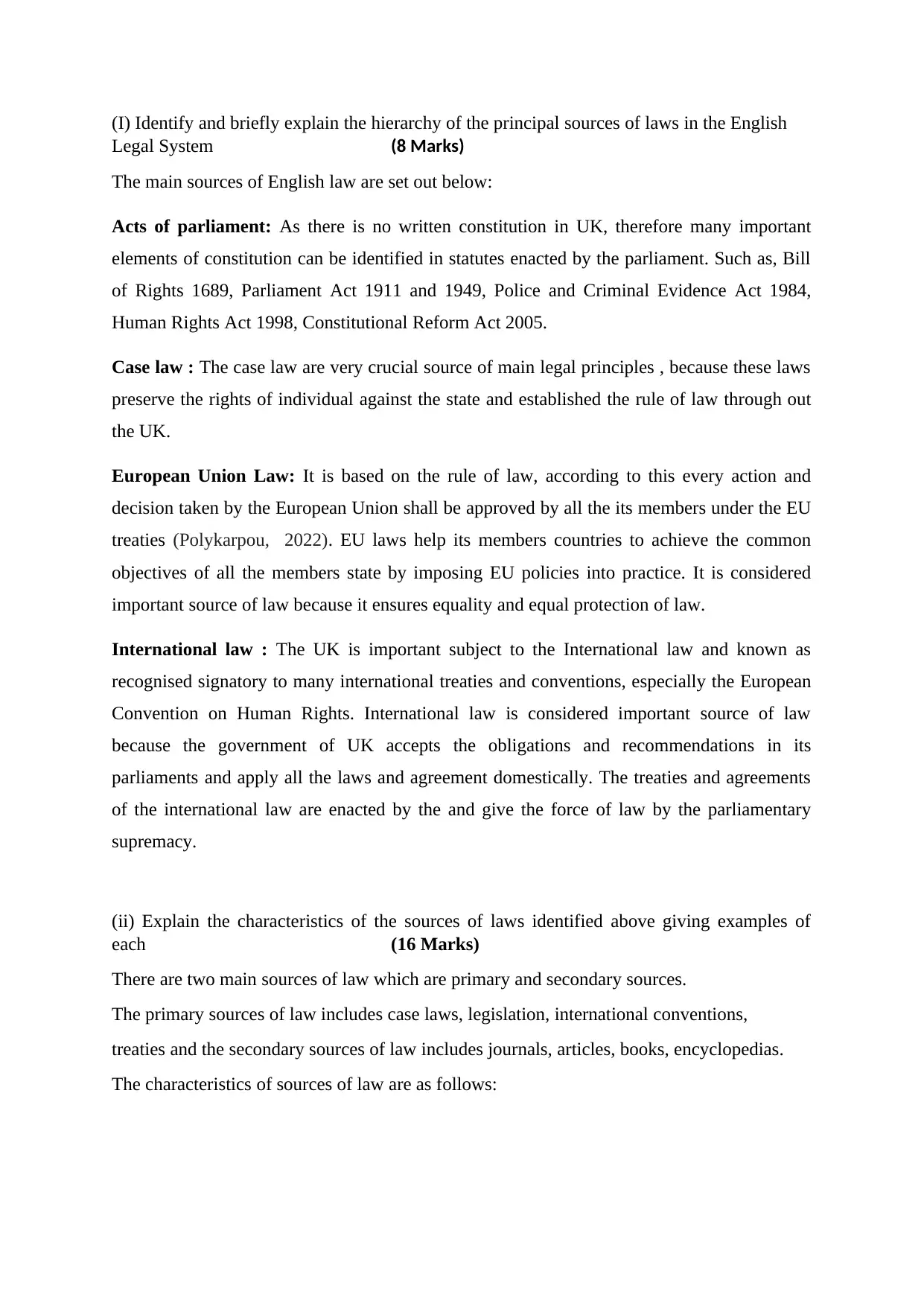
(I) Identify and briefly explain the hierarchy of the principal sources of laws in the English
Legal System (8 Marks)
The main sources of English law are set out below:
Acts of parliament: As there is no written constitution in UK, therefore many important
elements of constitution can be identified in statutes enacted by the parliament. Such as, Bill
of Rights 1689, Parliament Act 1911 and 1949, Police and Criminal Evidence Act 1984,
Human Rights Act 1998, Constitutional Reform Act 2005.
Case law : The case law are very crucial source of main legal principles , because these laws
preserve the rights of individual against the state and established the rule of law through out
the UK.
European Union Law: It is based on the rule of law, according to this every action and
decision taken by the European Union shall be approved by all the its members under the EU
treaties (Polykarpou, 2022). EU laws help its members countries to achieve the common
objectives of all the members state by imposing EU policies into practice. It is considered
important source of law because it ensures equality and equal protection of law.
International law : The UK is important subject to the International law and known as
recognised signatory to many international treaties and conventions, especially the European
Convention on Human Rights. International law is considered important source of law
because the government of UK accepts the obligations and recommendations in its
parliaments and apply all the laws and agreement domestically. The treaties and agreements
of the international law are enacted by the and give the force of law by the parliamentary
supremacy.
(ii) Explain the characteristics of the sources of laws identified above giving examples of
each (16 Marks)
There are two main sources of law which are primary and secondary sources.
The primary sources of law includes case laws, legislation, international conventions,
treaties and the secondary sources of law includes journals, articles, books, encyclopedias.
The characteristics of sources of law are as follows:
Legal System (8 Marks)
The main sources of English law are set out below:
Acts of parliament: As there is no written constitution in UK, therefore many important
elements of constitution can be identified in statutes enacted by the parliament. Such as, Bill
of Rights 1689, Parliament Act 1911 and 1949, Police and Criminal Evidence Act 1984,
Human Rights Act 1998, Constitutional Reform Act 2005.
Case law : The case law are very crucial source of main legal principles , because these laws
preserve the rights of individual against the state and established the rule of law through out
the UK.
European Union Law: It is based on the rule of law, according to this every action and
decision taken by the European Union shall be approved by all the its members under the EU
treaties (Polykarpou, 2022). EU laws help its members countries to achieve the common
objectives of all the members state by imposing EU policies into practice. It is considered
important source of law because it ensures equality and equal protection of law.
International law : The UK is important subject to the International law and known as
recognised signatory to many international treaties and conventions, especially the European
Convention on Human Rights. International law is considered important source of law
because the government of UK accepts the obligations and recommendations in its
parliaments and apply all the laws and agreement domestically. The treaties and agreements
of the international law are enacted by the and give the force of law by the parliamentary
supremacy.
(ii) Explain the characteristics of the sources of laws identified above giving examples of
each (16 Marks)
There are two main sources of law which are primary and secondary sources.
The primary sources of law includes case laws, legislation, international conventions,
treaties and the secondary sources of law includes journals, articles, books, encyclopedias.
The characteristics of sources of law are as follows:
Paraphrase This Document
Need a fresh take? Get an instant paraphrase of this document with our AI Paraphraser
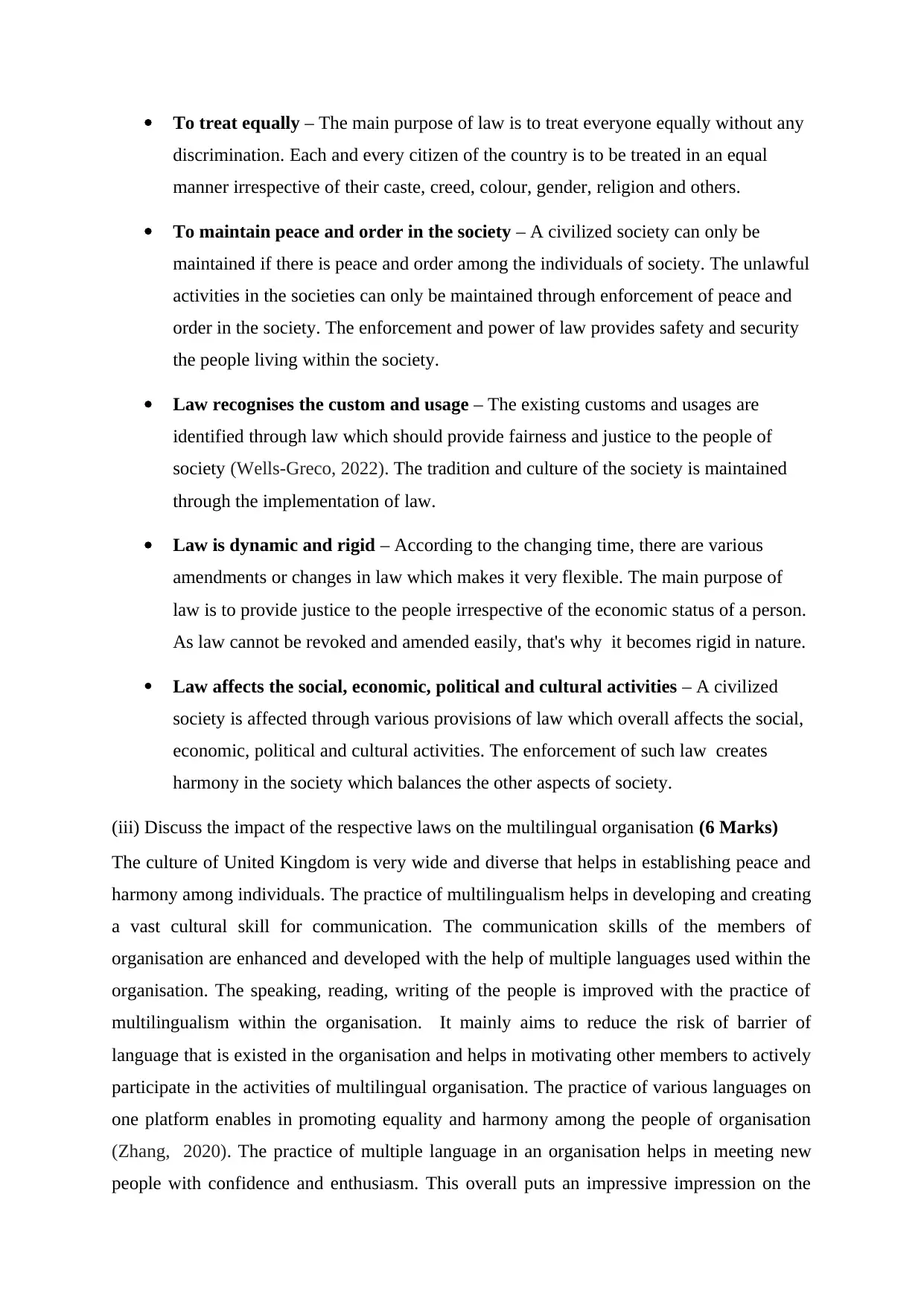
To treat equally – The main purpose of law is to treat everyone equally without any
discrimination. Each and every citizen of the country is to be treated in an equal
manner irrespective of their caste, creed, colour, gender, religion and others.
To maintain peace and order in the society – A civilized society can only be
maintained if there is peace and order among the individuals of society. The unlawful
activities in the societies can only be maintained through enforcement of peace and
order in the society. The enforcement and power of law provides safety and security
the people living within the society.
Law recognises the custom and usage – The existing customs and usages are
identified through law which should provide fairness and justice to the people of
society (Wells-Greco, 2022). The tradition and culture of the society is maintained
through the implementation of law.
Law is dynamic and rigid – According to the changing time, there are various
amendments or changes in law which makes it very flexible. The main purpose of
law is to provide justice to the people irrespective of the economic status of a person.
As law cannot be revoked and amended easily, that's why it becomes rigid in nature.
Law affects the social, economic, political and cultural activities – A civilized
society is affected through various provisions of law which overall affects the social,
economic, political and cultural activities. The enforcement of such law creates
harmony in the society which balances the other aspects of society.
(iii) Discuss the impact of the respective laws on the multilingual organisation (6 Marks)
The culture of United Kingdom is very wide and diverse that helps in establishing peace and
harmony among individuals. The practice of multilingualism helps in developing and creating
a vast cultural skill for communication. The communication skills of the members of
organisation are enhanced and developed with the help of multiple languages used within the
organisation. The speaking, reading, writing of the people is improved with the practice of
multilingualism within the organisation. It mainly aims to reduce the risk of barrier of
language that is existed in the organisation and helps in motivating other members to actively
participate in the activities of multilingual organisation. The practice of various languages on
one platform enables in promoting equality and harmony among the people of organisation
(Zhang, 2020). The practice of multiple language in an organisation helps in meeting new
people with confidence and enthusiasm. This overall puts an impressive impression on the
discrimination. Each and every citizen of the country is to be treated in an equal
manner irrespective of their caste, creed, colour, gender, religion and others.
To maintain peace and order in the society – A civilized society can only be
maintained if there is peace and order among the individuals of society. The unlawful
activities in the societies can only be maintained through enforcement of peace and
order in the society. The enforcement and power of law provides safety and security
the people living within the society.
Law recognises the custom and usage – The existing customs and usages are
identified through law which should provide fairness and justice to the people of
society (Wells-Greco, 2022). The tradition and culture of the society is maintained
through the implementation of law.
Law is dynamic and rigid – According to the changing time, there are various
amendments or changes in law which makes it very flexible. The main purpose of
law is to provide justice to the people irrespective of the economic status of a person.
As law cannot be revoked and amended easily, that's why it becomes rigid in nature.
Law affects the social, economic, political and cultural activities – A civilized
society is affected through various provisions of law which overall affects the social,
economic, political and cultural activities. The enforcement of such law creates
harmony in the society which balances the other aspects of society.
(iii) Discuss the impact of the respective laws on the multilingual organisation (6 Marks)
The culture of United Kingdom is very wide and diverse that helps in establishing peace and
harmony among individuals. The practice of multilingualism helps in developing and creating
a vast cultural skill for communication. The communication skills of the members of
organisation are enhanced and developed with the help of multiple languages used within the
organisation. The speaking, reading, writing of the people is improved with the practice of
multilingualism within the organisation. It mainly aims to reduce the risk of barrier of
language that is existed in the organisation and helps in motivating other members to actively
participate in the activities of multilingual organisation. The practice of various languages on
one platform enables in promoting equality and harmony among the people of organisation
(Zhang, 2020). The practice of multiple language in an organisation helps in meeting new
people with confidence and enthusiasm. This overall puts an impressive impression on the
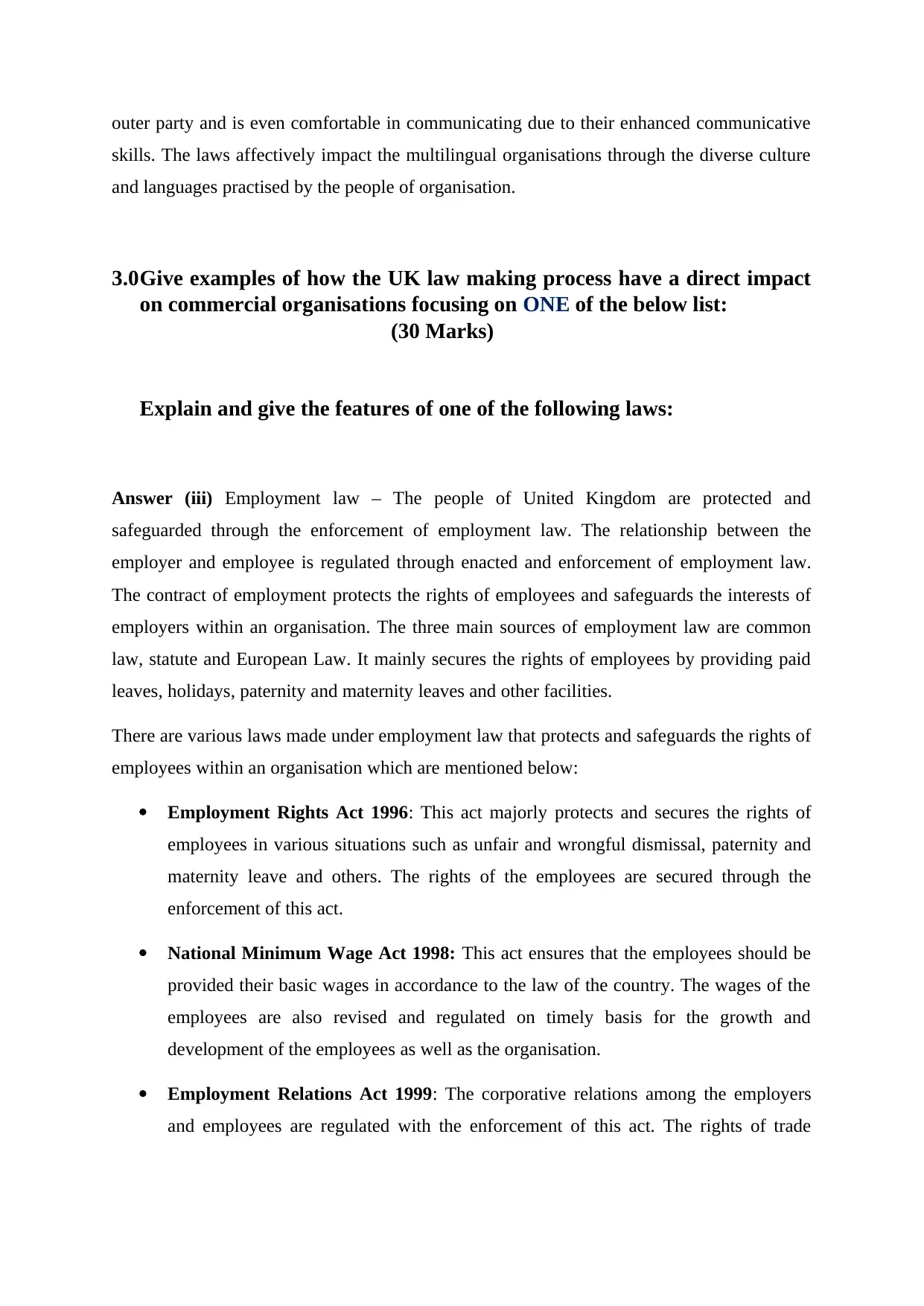
outer party and is even comfortable in communicating due to their enhanced communicative
skills. The laws affectively impact the multilingual organisations through the diverse culture
and languages practised by the people of organisation.
3.0Give examples of how the UK law making process have a direct impact
on commercial organisations focusing on ONE of the below list:
(30 Marks)
Explain and give the features of one of the following laws:
Answer (iii) Employment law – The people of United Kingdom are protected and
safeguarded through the enforcement of employment law. The relationship between the
employer and employee is regulated through enacted and enforcement of employment law.
The contract of employment protects the rights of employees and safeguards the interests of
employers within an organisation. The three main sources of employment law are common
law, statute and European Law. It mainly secures the rights of employees by providing paid
leaves, holidays, paternity and maternity leaves and other facilities.
There are various laws made under employment law that protects and safeguards the rights of
employees within an organisation which are mentioned below:
Employment Rights Act 1996: This act majorly protects and secures the rights of
employees in various situations such as unfair and wrongful dismissal, paternity and
maternity leave and others. The rights of the employees are secured through the
enforcement of this act.
National Minimum Wage Act 1998: This act ensures that the employees should be
provided their basic wages in accordance to the law of the country. The wages of the
employees are also revised and regulated on timely basis for the growth and
development of the employees as well as the organisation.
Employment Relations Act 1999: The corporative relations among the employers
and employees are regulated with the enforcement of this act. The rights of trade
skills. The laws affectively impact the multilingual organisations through the diverse culture
and languages practised by the people of organisation.
3.0Give examples of how the UK law making process have a direct impact
on commercial organisations focusing on ONE of the below list:
(30 Marks)
Explain and give the features of one of the following laws:
Answer (iii) Employment law – The people of United Kingdom are protected and
safeguarded through the enforcement of employment law. The relationship between the
employer and employee is regulated through enacted and enforcement of employment law.
The contract of employment protects the rights of employees and safeguards the interests of
employers within an organisation. The three main sources of employment law are common
law, statute and European Law. It mainly secures the rights of employees by providing paid
leaves, holidays, paternity and maternity leaves and other facilities.
There are various laws made under employment law that protects and safeguards the rights of
employees within an organisation which are mentioned below:
Employment Rights Act 1996: This act majorly protects and secures the rights of
employees in various situations such as unfair and wrongful dismissal, paternity and
maternity leave and others. The rights of the employees are secured through the
enforcement of this act.
National Minimum Wage Act 1998: This act ensures that the employees should be
provided their basic wages in accordance to the law of the country. The wages of the
employees are also revised and regulated on timely basis for the growth and
development of the employees as well as the organisation.
Employment Relations Act 1999: The corporative relations among the employers
and employees are regulated with the enforcement of this act. The rights of trade
⊘ This is a preview!⊘
Do you want full access?
Subscribe today to unlock all pages.

Trusted by 1+ million students worldwide
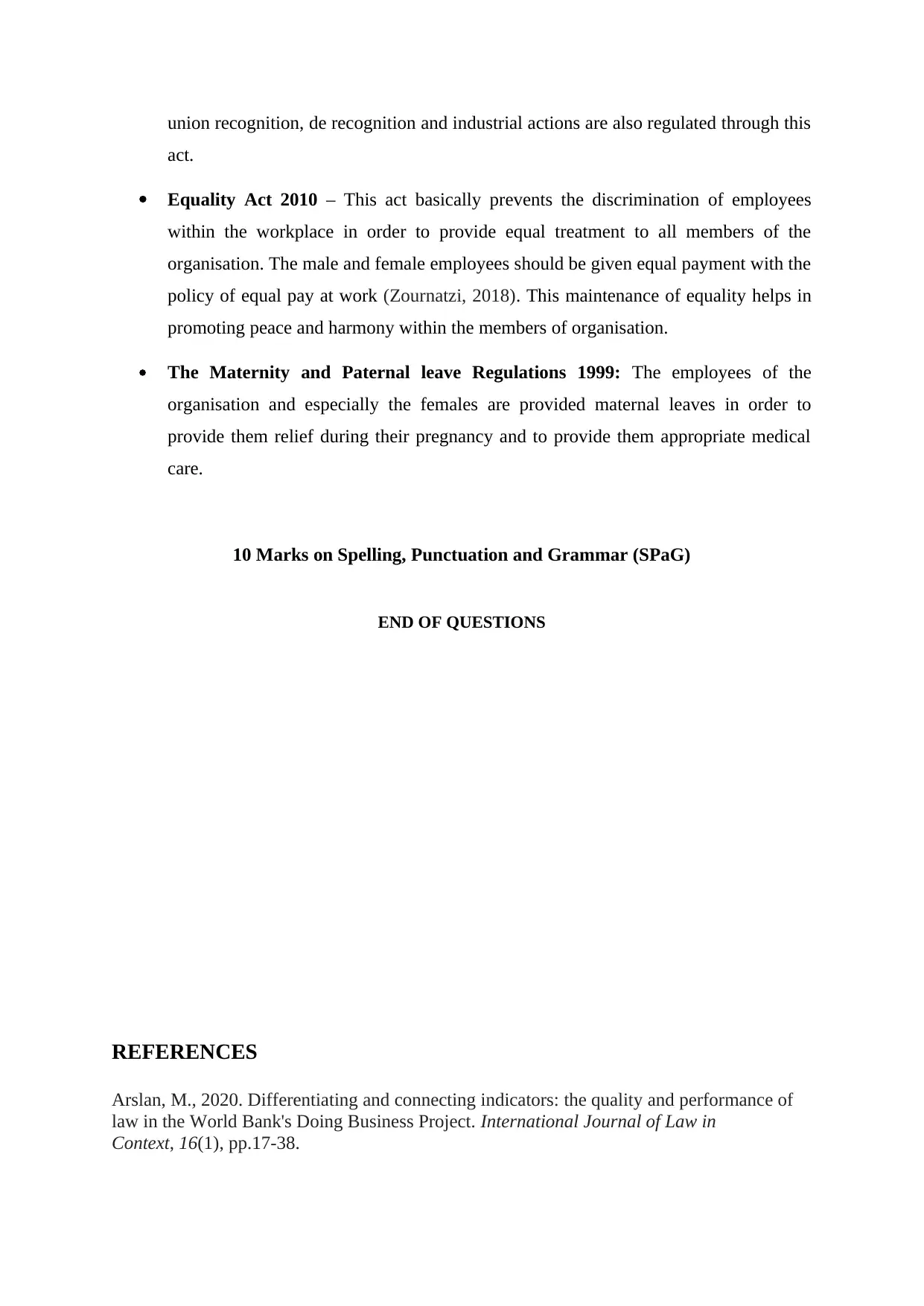
union recognition, de recognition and industrial actions are also regulated through this
act.
Equality Act 2010 – This act basically prevents the discrimination of employees
within the workplace in order to provide equal treatment to all members of the
organisation. The male and female employees should be given equal payment with the
policy of equal pay at work (Zournatzi, 2018). This maintenance of equality helps in
promoting peace and harmony within the members of organisation.
The Maternity and Paternal leave Regulations 1999: The employees of the
organisation and especially the females are provided maternal leaves in order to
provide them relief during their pregnancy and to provide them appropriate medical
care.
10 Marks on Spelling, Punctuation and Grammar (SPaG)
END OF QUESTIONS
REFERENCES
Arslan, M., 2020. Differentiating and connecting indicators: the quality and performance of
law in the World Bank's Doing Business Project. International Journal of Law in
Context, 16(1), pp.17-38.
act.
Equality Act 2010 – This act basically prevents the discrimination of employees
within the workplace in order to provide equal treatment to all members of the
organisation. The male and female employees should be given equal payment with the
policy of equal pay at work (Zournatzi, 2018). This maintenance of equality helps in
promoting peace and harmony within the members of organisation.
The Maternity and Paternal leave Regulations 1999: The employees of the
organisation and especially the females are provided maternal leaves in order to
provide them relief during their pregnancy and to provide them appropriate medical
care.
10 Marks on Spelling, Punctuation and Grammar (SPaG)
END OF QUESTIONS
REFERENCES
Arslan, M., 2020. Differentiating and connecting indicators: the quality and performance of
law in the World Bank's Doing Business Project. International Journal of Law in
Context, 16(1), pp.17-38.
Paraphrase This Document
Need a fresh take? Get an instant paraphrase of this document with our AI Paraphraser
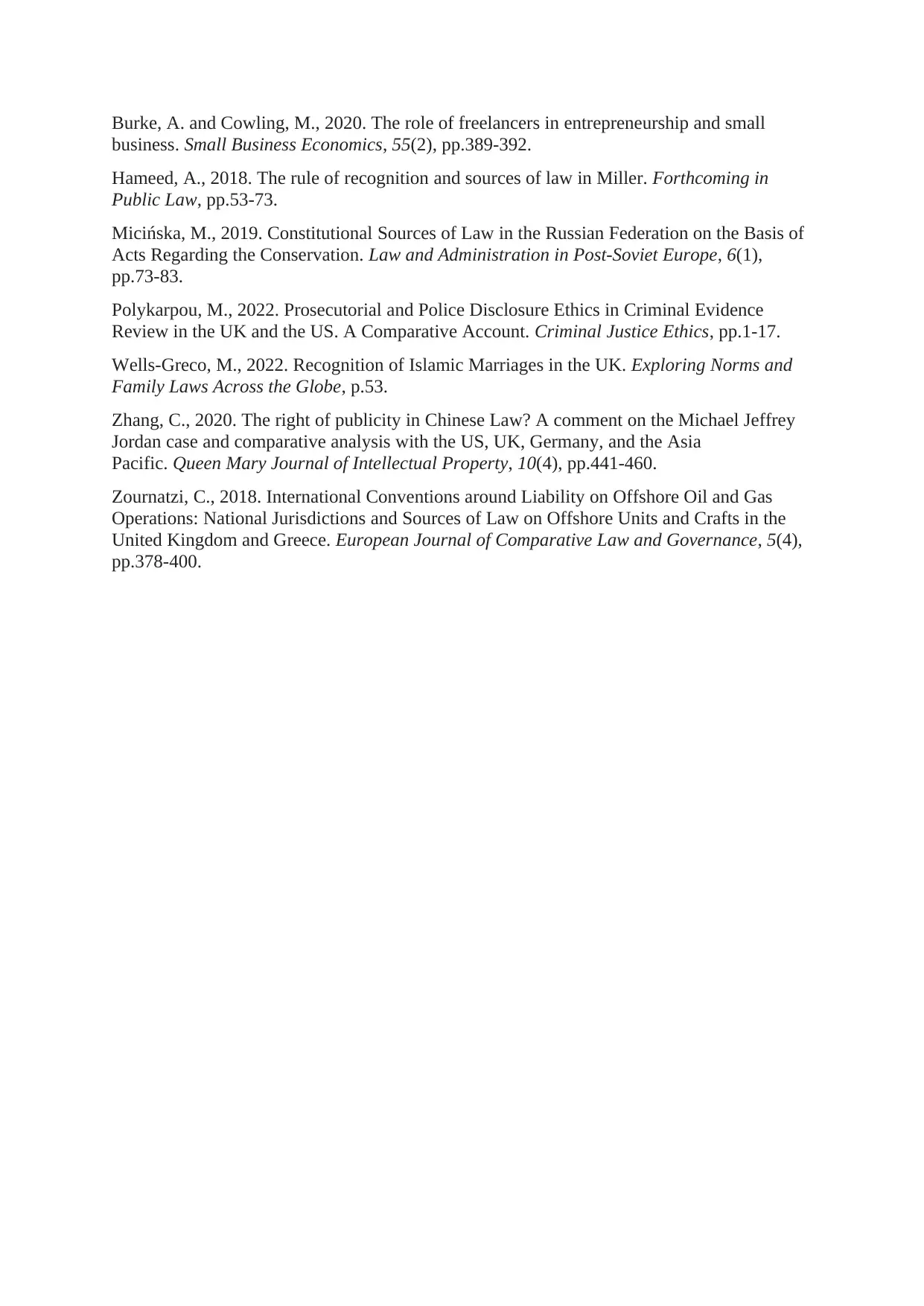
Burke, A. and Cowling, M., 2020. The role of freelancers in entrepreneurship and small
business. Small Business Economics, 55(2), pp.389-392.
Hameed, A., 2018. The rule of recognition and sources of law in Miller. Forthcoming in
Public Law, pp.53-73.
Micińska, M., 2019. Constitutional Sources of Law in the Russian Federation on the Basis of
Acts Regarding the Conservation. Law and Administration in Post-Soviet Europe, 6(1),
pp.73-83.
Polykarpou, M., 2022. Prosecutorial and Police Disclosure Ethics in Criminal Evidence
Review in the UK and the US. A Comparative Account. Criminal Justice Ethics, pp.1-17.
Wells-Greco, M., 2022. Recognition of Islamic Marriages in the UK. Exploring Norms and
Family Laws Across the Globe, p.53.
Zhang, C., 2020. The right of publicity in Chinese Law? A comment on the Michael Jeffrey
Jordan case and comparative analysis with the US, UK, Germany, and the Asia
Pacific. Queen Mary Journal of Intellectual Property, 10(4), pp.441-460.
Zournatzi, C., 2018. International Conventions around Liability on Offshore Oil and Gas
Operations: National Jurisdictions and Sources of Law on Offshore Units and Crafts in the
United Kingdom and Greece. European Journal of Comparative Law and Governance, 5(4),
pp.378-400.
business. Small Business Economics, 55(2), pp.389-392.
Hameed, A., 2018. The rule of recognition and sources of law in Miller. Forthcoming in
Public Law, pp.53-73.
Micińska, M., 2019. Constitutional Sources of Law in the Russian Federation on the Basis of
Acts Regarding the Conservation. Law and Administration in Post-Soviet Europe, 6(1),
pp.73-83.
Polykarpou, M., 2022. Prosecutorial and Police Disclosure Ethics in Criminal Evidence
Review in the UK and the US. A Comparative Account. Criminal Justice Ethics, pp.1-17.
Wells-Greco, M., 2022. Recognition of Islamic Marriages in the UK. Exploring Norms and
Family Laws Across the Globe, p.53.
Zhang, C., 2020. The right of publicity in Chinese Law? A comment on the Michael Jeffrey
Jordan case and comparative analysis with the US, UK, Germany, and the Asia
Pacific. Queen Mary Journal of Intellectual Property, 10(4), pp.441-460.
Zournatzi, C., 2018. International Conventions around Liability on Offshore Oil and Gas
Operations: National Jurisdictions and Sources of Law on Offshore Units and Crafts in the
United Kingdom and Greece. European Journal of Comparative Law and Governance, 5(4),
pp.378-400.
1 out of 8
Related Documents
Your All-in-One AI-Powered Toolkit for Academic Success.
+13062052269
info@desklib.com
Available 24*7 on WhatsApp / Email
![[object Object]](/_next/static/media/star-bottom.7253800d.svg)
Unlock your academic potential
Copyright © 2020–2025 A2Z Services. All Rights Reserved. Developed and managed by ZUCOL.


